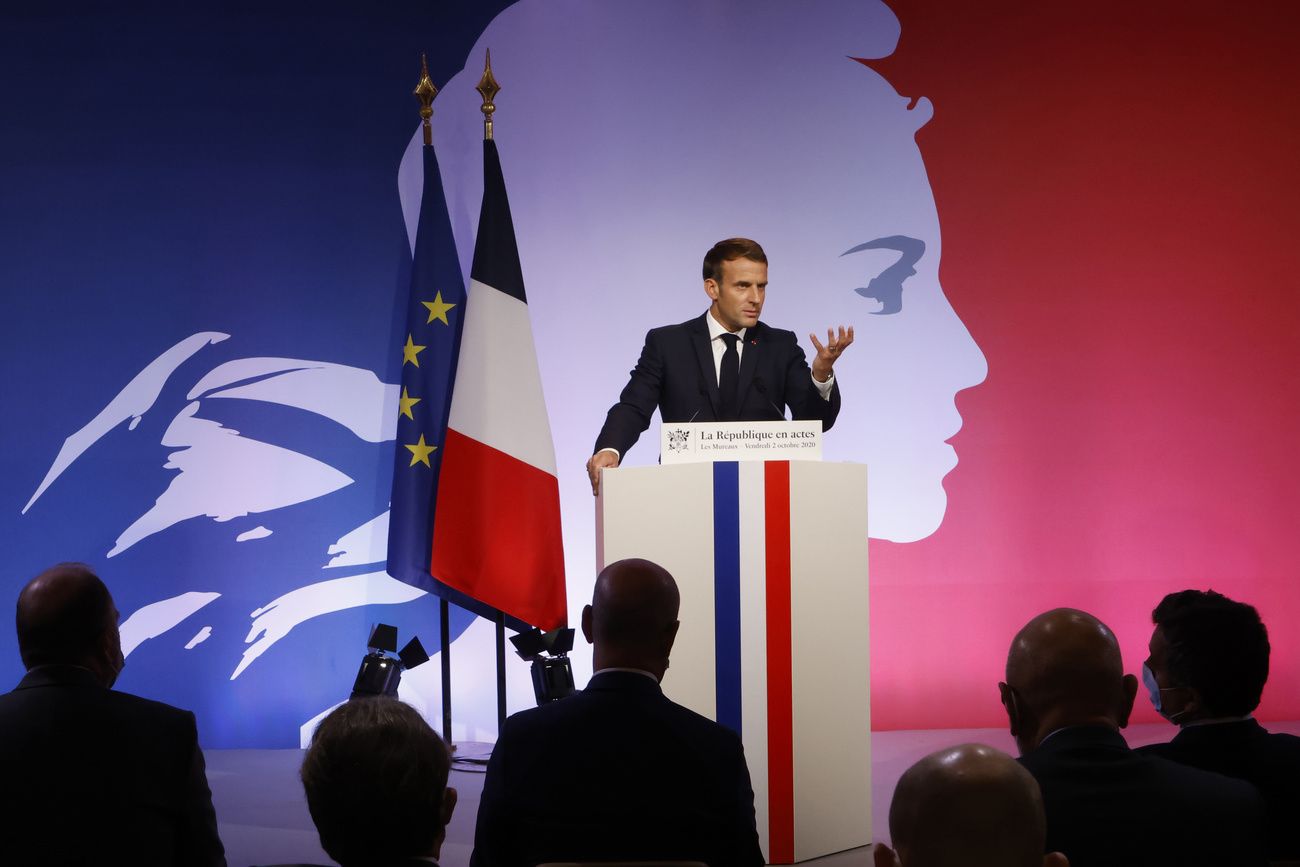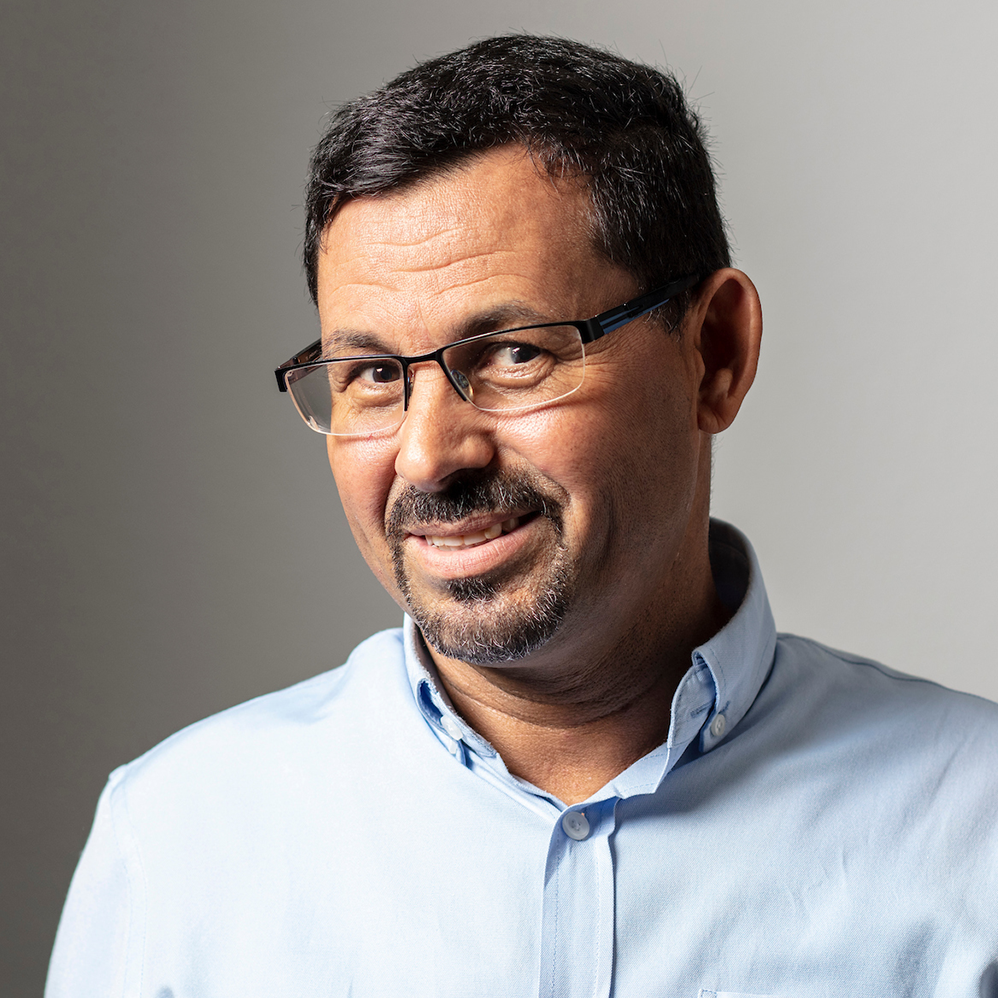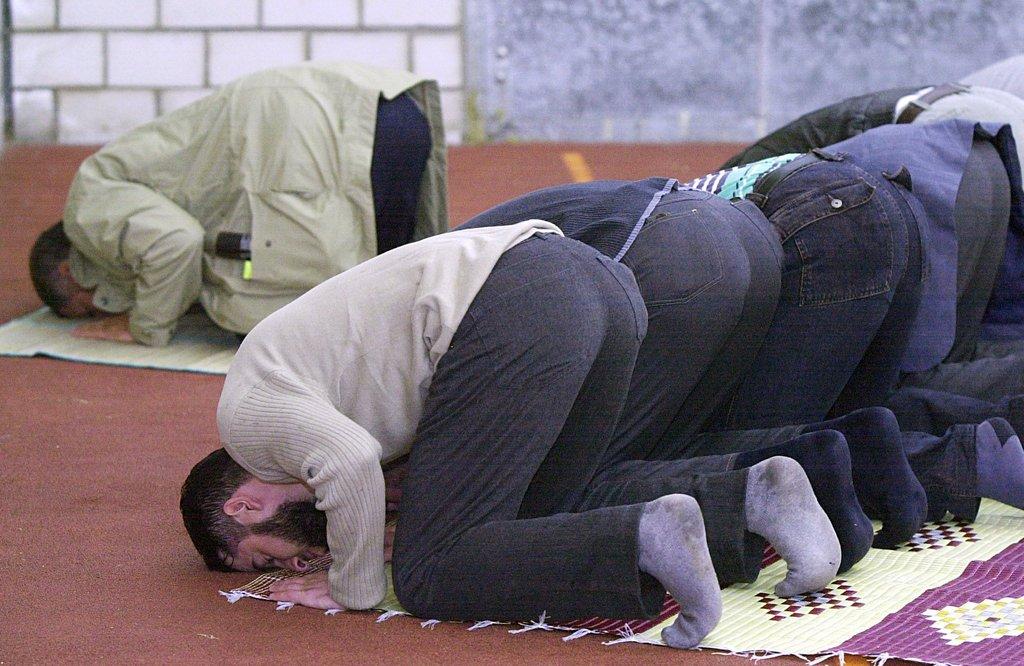How Switzerland and France approach ‘Islamic separatism’

Could a controversial French action plan to tackle “parallel societies” within the Muslim community resonate in neighbouring Switzerland?
In a speech delivered earlier this month from Les Mureaux, a sprawling suburb northwest of Paris plagued by social and economic problems, French President Emmanuel Macron unveiled a broad outline of measures to address “Islamic separatism” and “free Islam in France from foreign influences” which he said would be drawn up into a law to be presented to parliament in December.
Macron’s vision is based on the conviction that France’s problems with its citizens of immigrant origin – who mainly came from former French colonies in northern and sub-Saharan Africa – are caused by their misinterpretations of Islam. According to Macron, “Islam is in crisis all over the world today” and the solution to France’s problems lies in the creation of a “French Islam that can coexist peacefully with the values of the Republic”.
His proposed measures have sparked criticismExternal link from observers, researchers and governments across the Islamic world. Turkey, for example, called it a “provocative plan, and a populist insult to Muslims, that was covering up for France’s failure to integrate its immigrants”.
However, the dramatic beheading of a French middle-school history teacher on October 16, which the police are treating as an act of terrorism (see infobox below), has added all the more urgency to Macron’s agenda.
French history teacher Samuel Paty was beheaded on October 16 outside his school in Conflans-Sainte-Honorine, in the northern Paris suburbs, by an 18-year-old Moscow-born Chechen refugee who was subsequently shot dead by police. The attacker had been living in the town of Evreux northwest of Paris. He was not previously known to the intelligence services.
Earlier this month, Paty showed his pupils cartoons of the Prophet Mohammad in a class on freedom of expression, angering a number of Muslim parents. Muslims believe that any depiction of the Prophet is blasphemous.
The killing sparked outrage in France and drew condemnation from President Emmanuel Macron and political parties. Tens of thousands of citizens paid tribute to the teacher on October 18 in various French cities. The killing carried echoes of an attack five years ago on the offices of satirical magazine Charlie Hebdo after it published the cartoons.
Geneva-based researcher Redha BenkiraneExternal link, who has studied contemporary Islam and inter-religious dialogue in both France and Switzerland, says Macron’s vision goes against a cornerstone of French society: the separation between religion and state.
“The irony is that while Macron is leading the defence of secularism in France, his proposals are actually reinforcing state intervention to shape the religious convictions of its citizens,” says the Swiss researcher.
Switzerland, which shares both a border and a language with France, does not have secularism written into its national laws; instead, governing the relationship between religion and society is left to its 26 cantons under its federalist system. swissinfo.ch spoke to Mallory Schneuwly PurdieExternal link, senior researcher at the Swiss Centre for Islam and Society, for perspective on what sets the countries apart when it comes to the integration of religion in everyday life, and whether Islam is also “in crisis”, as Macron put it, in the Alpine state.
swissinfo.ch: What are the fundamental differences between the French and Swiss models when it comes to the relationship between religion and government?
Mallory Schneuwly Purdie: Legally and culturally, Switzerland still recognises the contribution of the historic Christian churches to the creation of common values. The management of religious communities is regulated at the level of the cantons, which is why there are 26 different ways in which the relationship between the churches and the state is handled. Switzerland also still finances the churches in part, through the cantons, and the state collects taxes from those belonging to a church and redistributes them to the community.
France does not formally recognise any religion or entitle it to special treatment under the law. As a result, the French state does not subsidise any religious community, except for prison chaplains, since prisoners cannot provide for their own spiritual needs. In France, religious communities must be financially self-sufficient.
1- Oblige Islamic organisations that requests funding from the French state to sign a “secular charter”
2- Strengthen the oversight on private schools, and the regulations that manage their work
3- Impose strict restrictions on home schooling
4- Call for a better understanding of Islam, and promote the teaching of Arabic to achieve an Islam that coexists peacefully with the Republic, and is free of “foreign influences”
5- Monitor international funding coming into places of worship
6- End the import of foreign-trained imams within four years; this measure is related to 300 imams who are sent to French mosques periodically by Morocco, Algeria and Turkey.
7- Establish “clear criteria” for training imams in France. Imams will no longer be trained abroad, and will be obliged to receive training in France. Increase control over the financing of this training.
8- Denounce the “ghetto” system that has developed in certain communities
swissinfo.ch: To what extent is the situation regarding Islam in Switzerland like what is happening in France?
M.S.P.: The situation is not comparable for various reasons. First of all, Muslim communities in Switzerland are marked by more internal differentiation than communities in the UK or other countries [like France]. Ethnically, linguistically and culturally the Muslim communities in Switzerland are pluralistic. Most of them are from the Balkans, followed by Turkey, the Maghreb, the Middle East and Sub-Saharan Africa. In the Balkans alone, there is a plurality: Muslims come from Kosovo, Albania, Northern Macedonia, Bosnia-Herzegovina and Southern Serbia. Urbanisation also plays a role, on the one hand because Switzerland still has cities of a smaller scale, and on the other hand, because of the diversity of the Muslim population, which limits urbanisation in terms of developing linguistic or cultural communities.
However, at the level of certain neighbourhoods, around certain urban centers [like] Geneva, Lausanne, Winterthur, St Gallen or Basel, there are small enclaves that can become closed communities.
swissinfo.ch: Do these enclaves represent any type of danger today?
M.S.P.: On the current scale, they do not represent a real danger. But we must be vigilant about the directions that these enclaves can take and the actions that they generate. If you’re a community that simply wants to live apart and not have contact with the political authorities, that doesn’t do any harm. It’s problematic for the authorities, it’s problematic for the neighborhood, but it’s not problematic for the rule of law. On the other hand, it becomes a problem if you have an enclave that puts itself in opposition to society, that wants to fight it, that wants to establish other rules and norms such as banning music in stores or parks, or tagging a butcher shop because it doesn’t sell halal meat. There it becomes more problematic because issues develop into enclave-based activism. The attitude towards society is what determines the level of danger.
swissinfo.ch: In the name of French secularism, Macron expressed his determination to “build an Islam that can be at peace with the French Republic,” to train imams locally, to limit access to private Islamic schools, and to strictly control the activities of cultural and sports associations. Might Bern and the Swiss cantons take up similar initiatives?
M.S.P.: Direct democracy and federalism don’t allow for such measures. But there are political parties and personalities that would like to have more supervision over imams or mosques’ preaching, training and financing. But this will not be possible if Muslim communities in Switzerland remain legally organised as civic associations, because then control is a matter of private law and not public law. It’s a bit of a paradox that we have in Switzerland. We want to control the mosques more, but to do so, we must give them more legal rights – and that’s precisely what many people don’t want to do. An example is the recent debates in the [French-speaking canton of] Neuchâtel over the legal recognition of religious communities [including Islam], and initiatives launched by [centre-right and right-wing parties] against the legislation.
swissinfo.ch: Some observers have said there could be an electoral agenda behind Macron’s plan for reforming Islam. Does the existence of direct democracy in Switzerland prevent politicians from playing the same game?
M.S.P.: Clearly, the two countries are on an equal footing here: in Switzerland, during election and vote campaigns, we see political parties playing up questions of immigration, religion, violence against minors…these issues carry a lot of emotion. Several cantons will have elections next year, and we can expect that debates over the upcoming [nationwide] burka initiative will have a place in those campaigns. Another example is the images of women wearing niqab on campaign posters during the minaret initiative. It’s a way of playing on emotions. Referendums introduced by [centre-right and right-wing parties] on the recognition of religious communities are yet another example. However, our political system based on direct democracy can limit certain political manoeuvres.

In compliance with the JTI standards
More: SWI swissinfo.ch certified by the Journalism Trust Initiative














You can find an overview of ongoing debates with our journalists here . Please join us!
If you want to start a conversation about a topic raised in this article or want to report factual errors, email us at english@swissinfo.ch.